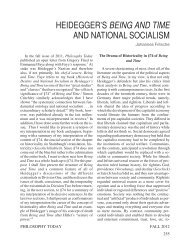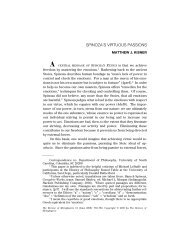Perverted Conversions: - Philosophy Documentation Center
Perverted Conversions: - Philosophy Documentation Center
Perverted Conversions: - Philosophy Documentation Center
Create successful ePaper yourself
Turn your PDF publications into a flip-book with our unique Google optimized e-Paper software.
— 144 —<br />
Rachel Walsh<br />
• • •<br />
are “accountable to no law and without any legitimate authority,” 27 yet who wield<br />
sovereign control over the prisoners. These “petty sovereigns” — the officers, private<br />
sector employees and managerial officials — perform and operate on cultural norms<br />
espoused by a civilizational discourse. As Butler asks, “And to what extent is there a<br />
racial and ethnic frame through which these imprisoned lives are viewed and judged<br />
such that they are deemed less than human, or as having departed from the recognizable<br />
human community?” 28<br />
That this “recognizable human community” is maintained through such violent<br />
measures, demanding that certain bodies be expelled, detained and killed in order to<br />
posit an Enlighten(ed)ment community, demands that we — the tentative “we” who<br />
are the viewers — consider how a dual interpellation is at work in the photographs.<br />
For if an Islamic Other is being addressed, a normative American subject is also<br />
being created.<br />
IV. “we have met the frankenstein monster and she is us”: 29 Abjection<br />
and the Imperial Pageant<br />
Just as torture results in the “loss of those defenses most recently acquired by<br />
civilized man,” the normalization of torture facilitated by these discourses results<br />
in what Slavoj Zizek recently identified as the gradual and collective loss of our<br />
moral sensitivity. 30 Or, rather, it reveals, as Angela Y. Davis, Susan Sontag and James<br />
Andreas Manos have argued, that “our moral sensitivity” is only extended to those<br />
who can be incorporated into the nation and whose bodies qualify as human.<br />
The photographs of Abu Ghraib, while staging the imagined cultural taboos<br />
of the Islamic Other, also reveal how certain bodies which fail or refuse to embody<br />
a heteronormative, white, middle-class national identity are coded as shameful. In<br />
Davis’s discussion of the Abu Ghraib photographs, she alludes to the fallibility of<br />
assuming that women’s sexuality and queer sexuality would not elicit shame and<br />
anger outside of Islamic cultures. As the photographs use shame as an instrument of<br />
torture, this point requires further enunciation: if one suggests that a certain act or<br />
position is capable of shaming an(other), then one must acknowledge that the act is<br />
shameful in order for the act of torture to be a felicitous or efficacious speech act.<br />
To assume that these photographs are shameful because queer sexuality is a religious<br />
taboo within Islam (a term that is reductive in itself, as few would refer to one<br />
27. Butler, Precarious Life, p. 56.<br />
28. Butler, Precarious Life, p. 57.<br />
29. Evie Shockley, “A Thousand Words,” A Half-Red Sea (Durham, North Carolina:<br />
Carolina Wren Press, 2006).<br />
30. Slavoj Zizek, “Knight of the Living Dead,” The New York Times, March 24, 2007, p. 13.

















